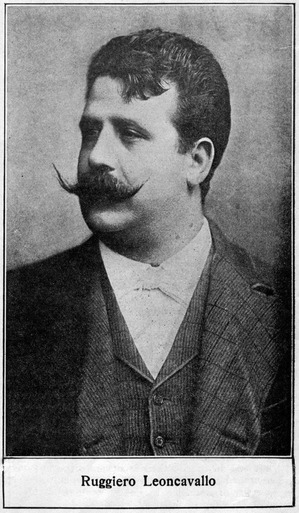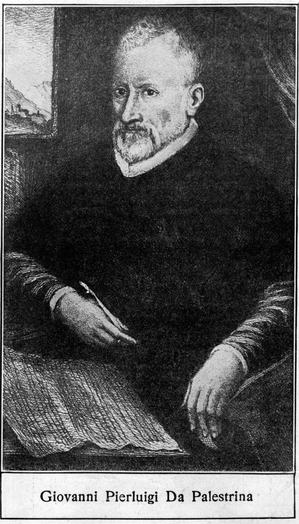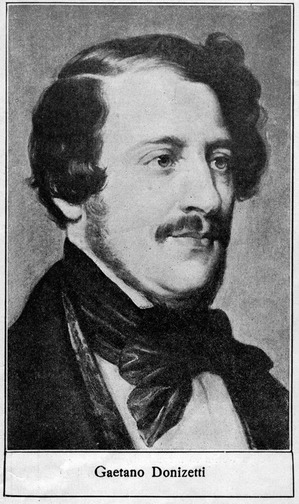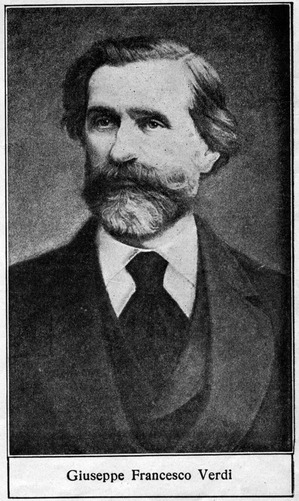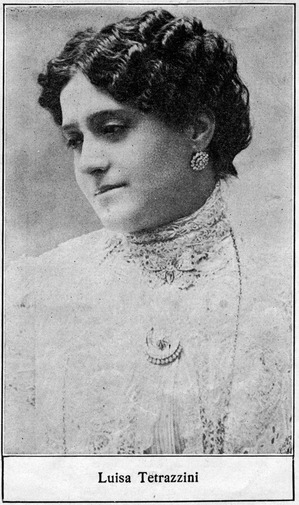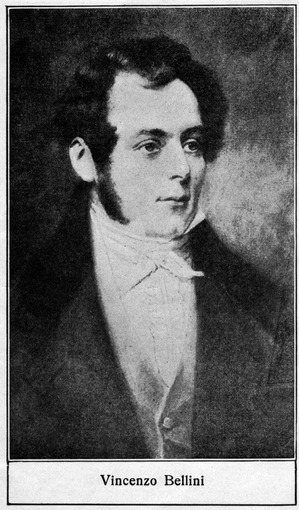With this issue the first year of the Gallery is complete. Seventy-two portrait-biographies of the masters have appeared and thousands of teachers and students have cut these out as indicated and made scrap books of them. We are pleased to announce that a new series will start with the next issue of "The Etude" and will be continued during the entire year. These portrait-biographies have great educational value and our readers should see that every copy of "The Etude" for next year is secured without fail, in order that the series may not be broken.
(Lay-on-cah-vah'-lyo.)
Leoncavallo was born at Naples, March 8, 1858, and studied at the Conservatory in that city. At the age of sixteen he produced an opera entitled "Tommaso Chatterton," which was a failure, though a subsequent revival in Rome, 1896, met with success. After this failure Leoncavallo went on tour as a pianist. While on his travels he met Wagner, from whom he received much encouragement. He quickly surrendered to the Wagnerian influence, strong evidence of which may be found in his trilogy, an "historic play," which consists of three complete operas depicting scenes from the Italian Renascence. It took Leoncavallo six years to collect the material for this work. It was not, however, until the production of "I Pagliacci" that Leoncavallo achieved anything like a reputation, though he was well known as a concert pianist in various European countries. He has written other works since then, including an orchestral tone-poem, and many songs, but "I Pagliacci" is the only work which has attracted very wide attention. It is frequently performed in conjunction with Mascagni's "Cavalleria Rusticana," which in character it somewhat resembles. It is also like Mascagni's opera inasmuch as it is the only work of the composer which has so far achieved real success. Leoncavallo, however, is not an old man, and it is possible the years may bring forth another work worthy of note.
( Pah-lays-tree'-na.)
Authorities differ about the date of the birth of Palestrina, some saying it was about 1515, and others about 1526. He was born at Palestrina, near Rome. It is believed that he studied in Rome, but in 1554 it is known that he was organist at the principal church in Palestrina. In 1551 he was appointed Magister Puerorum (Master of the boys) at St. Peter's, Rome, and later advanced to the post of maestro. In 1855 he entered the papal chapel, but on the accession of Pope Paul IV in the same year he was dismissed—largely, it is thought, on account of the jealousy of his colleagues. He was later appointed canon of the Lateran, and soon became maestro. From the Lateran he went to Santa Maria Maggiore, where he remained until 1571. The low standard of music in the Church at this time was under discussion by the Council of Trent, and Palestrina was instrumental in convincing them of the value of contrapuntal music, as opposed to plain song. His famous "Missa Papæ Marcelli" did not, as so many dictionaries state, win the day for polyphonic music on its intrinsic merits, but was recommended by a papal brief as the model from which Church music should be formed. His art was given entirely to the Church, and Palestrina is, perhaps, the greatest composer the Roman Catholic Church has produced.
(Don-i-set'-ti.)
Donizetti was born November 29, 1797, at Bergamo, where he died April 8, 1848. After studying under a local teacher, Simon Meyer, he went to Bologna, 1815, and studied under Pilotti and Mattei. His first opera, "Enrico Conte," was first produced at Venice in 1818. He fell easily under the influence of Rossini, who was then in the zenith of his fame. Donizetti found a strenuous rival in Bellini, and from 1822 to 1836 he wrote three or four operas a year. Naturally they lacked finish. His opera "Marino Falieri," Paris, 1835, was greatly overshadowed by the success of Bellini's "Puritani," and consequently Donizetti was obliged to put forth his greatest efforts in order to regain his lost prestige. "Lucia di Lammermoor" was the outcome, and the death of Bellini, which occurred shortly after, left him undisputed master of the stage. After the success of "Lucia," Donizetti was appointed professor of counterpoint at the Naples Conservatory. Piqued by the refusal of the censorship of Naples to permit the production of his "Poliuto," Donizetti went to Paris. The comparative failure of "The Daughter of the Regiment" and "La Favorita" drove him to Rome, Milan, Venice and, later, Vienna. During his last years he was subject to fits of melancholy, and he fell a victim to mental disorder.
(Vair'-dee.)
Verdi was born at La Roncole, near Busseto, Parma, October 9, 1813, and died at Milan, January 27, 1901. He was the son of the village innkeeper, who was also a grocer. He first studied under the local organist, whom he succeeded at the age of ten. In 1831 his father's friend, Barezzi, provided him with means to go to the Conservatory at Milan, but the director of that institution rejected him. Verdi therefore studied under Lavigna, the cembalist at La Scala Theatre. In 1833 he returned to his native village. In 1836 he married the daughter of his benefactor, Barezzi. He returned to Milan in 1838, and his opera, "Oberto," was accepted. It was a great success, and Verdi was commissioned to write three other operas, one every eight months. The sudden death of his wife and two children, however, saddened him, and the first of these operas, a comic one, disgusted Verdi so much, and failed so signally, that it was two years before he again wrote an opera. "Nebuchadnezzar" was the next venture, and attained great popularity. After this came a long series of successful operas, including "Rigoletto" and "II Trovatore," and culminating in his masterpieces, "Aïda," "Otello," "Falstaff" and the "Requiem Mass." While influenced by Wagner and others, Verdi preserved his own individuality in a remarkable degree.
( Tay-trah-tzee'-nee.)
Tetrazzini was born in Florence, Italy, June 29, 1874, and declares that she began to sing before she could talk. The fact that her elder sister (now the wife of Cleofante Campanini, the noted conductor) established a reputation as a public singer fired her ambition to go and do likewise. Her parents were well off financially, her father being in business in Florence. They opposed young Luisa's plans as far as possible, but persistency won the day, and she was permitted to go to the Lycée, where she studied under Professor Cieccherini; She already had more than a dozen grand opera roles committed to memory, and her teacher found at the end of six months that he could do no more for her. Tetrazzini's first appearance was made at the opera in Florence as Inez in L'Africaine. She met with such success that she was engaged at once at a salary of $100 a month, and highly complimented by the Queen in Italy. She soon earned something of a reputation, and played for seven seasons in St. Petersburg, three in Mexico, two in Madrid, four in Buenos Ayres and even on the Pacific Coast of the United States before her first appearance at Covent Garden. At this performance her rendering of Lucia, much to her surprise, caused her to be called before the curtain twenty times. Then Mr. Hammerstein found he wanted her for New York—and she came, saw, was seen, heard and met with complete triumph.
(Bell-ee'-nee.)
Bellini was born at Catania, Sicily, November 3, 1801, and died at Puteaux, near Paris, September 24, 1835. His musical education was in the hands of Zingarelli, at the Conservatory of Naples. The young composer wrote many now-forgotten instrumental and sacred works before turning his attention to opera. His first opera was "Adelson e Sabrina," which was produced at the Naples Conservatory in 1825. This met with such success that Bellini composed "Bianco e Fernando," which was produced at the San Carlo Theatre. After this he was invited to write an opera for production at La Scala, Milan. "I Puritani" met with great approval, and was followed by other works of a similar nature, including the melodious "La Sonnambula." His greatest success was "Norma," which, with Malibran as prima donna, created a tremendous furore at La Scala. In 1833 Bellini went to Paris, where he was greatly admired. Unfortunately he was only able to write one opera—"I Puritani" —before his untimely death cut short what promised to be a great career. Critics of the period found fault with him for his meagre orchestration, but in his later operas he put more workmanship into his compositions, and "Norma" was a notable advance on its predecessors. He had the melodic gift so dear to the Italian heart.


